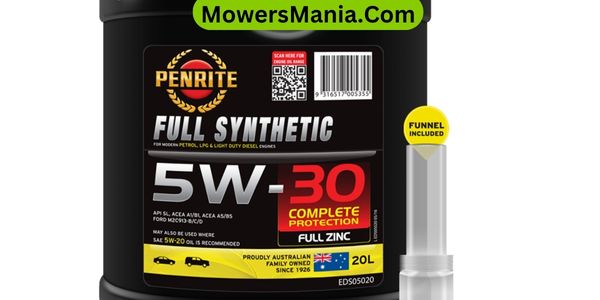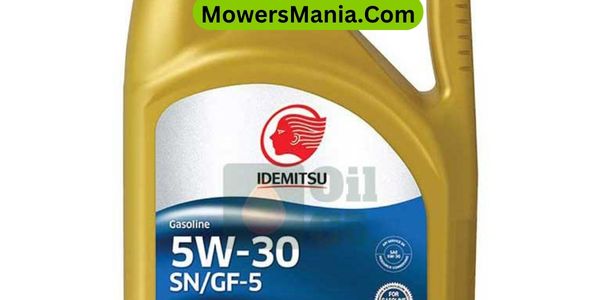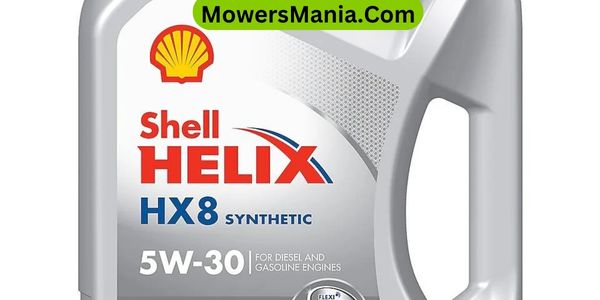Hey there, wondering if you can use 5W-30 oil in your lawn mower? You’re not alone! Using the right oil is crucial for keeping your mower running smoothly.
In this guide, we’ll cover everything you need to know about using 5W-30 oil in your lawn mower. We’ll explore its viscosity, compatibility with mower engines, benefits, potential drawbacks, and the proper steps for an oil change.

By the end, you’ll have a clear understanding of whether 5W-30 oil is the right choice for your lawn mower. Let’s dive in and get your mower running like a well-oiled machine!
Understanding 5W-30 Oil Viscosity
You can understand 5W-30 oil viscosity by considering its flow characteristics at different temperatures. The ‘5W’ in 5W-30 stands for the oil’s viscosity rating in cold temperatures, with the ‘W’ standing for winter.
This means that the oil has been tested and will perform well in colder climates. The lower the number before the ‘W,’ the better the oil will perform in cold weather.
Once the engine is running and the oil warms up, the second number, in this case, ’30,’ comes into play. This number represents the oil’s viscosity at operating temperatures.
A 5W-30 oil will remain thin enough to flow quickly and provide proper lubrication when the engine is first started, and it will also maintain the right thickness to protect the engine at higher temperatures.
Understanding these characteristics is crucial as it ensures that your engine will receive proper lubrication in all weather conditions, ultimately leading to better engine performance and longevity.
Compatibility With Lawn Mower Engines
Understanding 5W-30 oil viscosity is essential when considering its compatibility with lawn mower engines. Most modern lawn mower engines are designed to work with 5W-30 oil, making it a suitable choice for your equipment.
This oil grade provides good lubrication and protection for small engines, ensuring smooth operation and longevity.
However, it’s crucial to check your lawn mower’s manual to confirm the recommended oil viscosity for your specific model. Some older or specialty lawn mowers may require different oil viscosities, so it’s important to adhere to the manufacturer’s guidelines.
Using 5W-30 oil in your lawn mower can offer various benefits, including improved cold-weather starting and better overall engine protection.
The versatility of 5W-30 oil makes it a popular choice for many small engines, providing reliable performance across a wide range of temperatures.
Additionally, using the recommended oil viscosity can prevent potential damage to your lawn mower’s engine, ensuring that it operates efficiently and effectively for years to come.
Always consult your equipment’s manual or a professional if you have any doubts about which oil to use.
Benefits of Using 5W-30 Oil

Using 5W-30 oil in your lawn mower offers several benefits.
It provides improved engine lubrication, ensuring smooth operation and longevity.
Additionally, it aids in cold weather starting and helps reduce engine wear, keeping your lawn mower running at its best.
Improved Engine Lubrication
When using 5W-30 oil in your lawn mower, it provides improved engine lubrication, resulting in better overall performance.
The 5W-30 oil flows more easily at lower temperatures, ensuring that critical engine parts are lubricated quickly upon startup. This reduces wear and tear on the engine, extending its lifespan.
Additionally, the improved lubrication helps maintain consistent engine performance, especially during cold weather starts. The oil’s ability to maintain its viscosity under varying temperature conditions ensures that the engine is effectively protected at all times.
Furthermore, using 5W-30 oil with its enhanced lubrication properties can lead to smoother operation and reduced friction within the engine, resulting in improved fuel efficiency.
Cold Weather Starting
If you want your lawn mower to start easily in cold weather, you should use 5W-30 oil for its improved flow at lower temperatures.
5W-30 oil has a lower cold-temperature viscosity compared to other oils, making it easier for the engine to turn over and start. When the temperature drops, the viscosity of oil becomes crucial for the engine to start smoothly.
This means that even in chilly weather conditions, the oil can quickly reach all the necessary engine components to provide proper lubrication and ensure a smooth start.
By using 5W-30 oil, you can avoid the struggle of getting your lawn mower to start in cold weather, saving you time and effort.
Reduced Engine Wear
For improved engine longevity and reduced wear, using 5W-30 oil in your lawn mower provides significant benefits.
The use of 5W-30 oil offers several advantages that contribute to the overall health and performance of your mower’s engine:
- Enhanced Lubrication: 5W-30 oil provides better lubrication, ensuring that engine components move smoothly and reducing friction that can lead to wear and tear.
- Improved Engine Protection: This oil maintains a stable viscosity under various temperatures, offering consistent protection to engine parts and reducing the risk of premature wear.
- Extended Engine Life: By minimizing wear on critical engine components, 5W-30 oil can help extend the overall lifespan of your lawn mower, saving you time and money on potential repairs.
These benefits make 5W-30 oil a valuable choice for maintaining the health and longevity of your lawn mower’s engine.
Potential Drawbacks and Considerations
You should consider potential drawbacks and considerations when using 5W-30 oil in your lawn mower.
One potential drawback is that 5W-30 oil may be more prone to evaporating in high-temperature conditions compared to thicker oils, potentially leading to decreased lubrication and increased engine wear.
Additionally, using 5W-30 oil in a hot climate or during the summer months may result in a higher oil consumption rate, requiring more frequent oil top-ups.
Another consideration is the compatibility of 5W-30 oil with older lawn mower models designed for thicker oils. Using a different oil viscosity than the one recommended by the manufacturer could affect the mower’s performance and longevity.
Furthermore, if your lawn mower has a warranty, using 5W-30 oil instead of the recommended oil viscosity may void the warranty.
It’s important to weigh these potential drawbacks and considerations before deciding to use 5W-30 oil in your lawn mower to ensure optimal performance and longevity.
Steps for Proper Oil Change
When it comes to a proper oil change for your lawn mower, understanding the oil viscosity requirements and following the proper disposal methods is crucial.
You’ll want to ensure that you’re using the right type of oil for your specific lawn mower model, as using the wrong viscosity can lead to engine damage.
Additionally, knowing how to dispose of the old oil in an environmentally friendly manner is equally important for maintaining both your lawn mower and the environment.
Oil Viscosity Requirements
To ensure the proper functioning of your lawn mower, selecting the correct oil viscosity is essential for maintaining optimal performance and longevity.
When changing the oil in your lawn mower, follow these steps to ensure the correct oil viscosity:
- Check the Manual: Refer to your lawn mower’s manual to identify the recommended oil viscosity for your specific model.
- Consider Temperature: Take into account the temperature range in which your lawn mower operates. Warmer temperatures may require a different viscosity than colder ones.
- Choose the Right Oil: Select an oil with the recommended viscosity range, such as SAE 30 for warmer temperatures or 10W-30 for varying conditions, to ensure proper lubrication and protection for your lawn mower engine.
Following these steps will help maintain the efficiency and longevity of your lawn mower.
Proper Disposal Methods
For proper disposal methods after an oil change, consult local regulations and recycling centers to ensure environmentally responsible practices.
Once you’ve drained the old oil, transfer it to a leak-proof container. Seal the container tightly to prevent spills.
Take the used oil to a recycling center, automotive store, or service station that accepts old oil. Many places that sell oil will also accept and recycle your used oil.
Avoid mixing the oil with other substances, as this can make it unrecyclable.
Never dispose of oil by pouring it on the ground, down a drain, or into a waterway.
Expert Recommendations

You should consider seeking advice from a professional mechanic or lawn mower specialist before making a final decision on the oil to use.
These experts can provide personalized recommendations based on the specific make and model of your lawn mower, as well as your geographic location and typical mowing conditions.
- Mechanic Consultation:
- A mechanic can assess the specific needs of your lawn mower’s engine and provide guidance on the most suitable oil viscosity and type.
- They may also offer insights into any manufacturer recommendations or warranty considerations that could impact your oil selection.
- Lawn Mower Specialist Input:
- A specialist who focuses solely on lawn mowers can offer valuable insights into the best oil choices for your particular model.
- They may have experience with similar lawn mowers operating in your area and can factor in any regional climate considerations.
- Consideration of Warranty and Longevity:
- Seeking professional advice can help ensure that the oil you use aligns with the manufacturer’s specifications, preserving your lawn mower’s warranty and promoting its long-term performance and longevity.
Frequently Asked Questions [FAQs]
Can I Use Synthetic 5W-30 Oil in My Lawn Mower, or Should I Stick to Conventional Oil?
You can use synthetic 5W-30 oil in your lawn mower for better performance and protection. It offers improved viscosity at different temperatures and reduces engine wear. Just ensure it meets the manufacturer’s specifications.
Are There Any Specific Additives or Treatments Recommended to Enhance the Performance of 5W-30 Oil in a Lawn Mower Engine?
To enhance 5W-30 oil performance in your lawn mower, use specially formulated additives or treatments designed for small engines. These can improve lubrication, minimize wear, and optimize engine efficiency, ensuring smooth operation and longevity.
Will Using 5W-30 Oil in My Lawn Mower Affect Its Warranty or Maintenance Schedule in Any Way?
Using 5W-30 oil in your lawn mower won’t affect its warranty or maintenance schedule unless the manufacturer specifically recommends against it. Consult your mower’s manual or a professional for the best advice.
How Does Using 5W-30 Oil in My Lawn Mower Compare to Using Other Viscosities, Such as 10W-30 or 10w-40?
When using 5W-30 oil in your lawn mower, it provides better cold-weather starting and protection. Compared to 10W-30 or 10W-40, it flows more easily, providing smoother operation and reducing engine wear.
Are There Any Environmental Considerations or Regulations to Be Aware of When Disposing of Used 5W-30 Oil From a Lawn Mower?
When disposing of used 5W-30 oil from a lawn mower, you should check local regulations. Some areas have specific requirements for oil disposal to protect the environment. Take it to a recycling center or hazardous waste facility.
Conclusion
So, can you use 5W-30 oil in your lawn mower? Yes, you can!
It’s compatible with most lawn mower engines and offers benefits such as better cold-weather starting and improved engine protection.
However, be sure to check your mower’s manual and consider the climate and usage conditions before making the switch.
Overall, using 5W-30 oil can be a great choice for maintaining your lawn mower and keeping it running smoothly.



